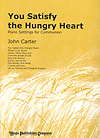- |
User Links
Gift of Finest Wheat
Hymn Information
- First Line
- As when a shepherd calls his sheep
- Author
- Omer Westendorf (1976)
- Tune Name
- BICENTENNIAL
- Composer
- Robert E. Kreutz (1976)
- Topic
- God's: Mystery · Hunger · Jesus Christ: Bread of Life · Elements of Worship: Lord's Supper
Copyright Information
- Text Copyright
- © 1977 Archdiocese of Philadelphia, published by International Liturgy Publications
- Tune Copyright
- © 1977 Archdiocese of Philadelphia, published by International Liturgy Publications
- Reprint/Projection Information
- Words and Music: Permitted with a license from CCLI.com or from OneLicense.net. If you do not own one of these licenses, please contact the copyright holder for permission.
Scripture References
Thematically related:
- st. Refrain = ·
- st. 1 =
- st. 2 =
- st. 3 =
- st. 4 =
- st. 5 =
Further Reflections on Scripture References
This beautiful song has become widely recognized as one of the finest recent Lord's Supper hymns, primarily because of its use of biblical images (see Scripture references). The stanzas introduce each of these images in turn, and the refrain repeatedly brings us back to the hymn's controlling thought: God's "gift of finest wheat" is Christ, "the bread of life" (Ps. 81:16; John 6:35). The solid theological text aptly presents many of the central meanings of the sacrament of the Lord's Supper.
Bert Polman, Psalter Hymnal Handbook
Confessions and Statements of Faith References
Further Reflections on Confessions and Statements of Faith References
The “heavenly food” referenced in stanza 2 reinforces the anticipation of being nurtured and nourished at the Lord’s Table. Heidelberg Catechism, Lord’s Day 28, Question and Answer 75 is a reminder that Christ “nourishes and refreshes my soul for eternal life,” and Lord’s Day 29, Question and Answer 78 assures us that the bread and wine “are the true food and drink of our souls for eternal life.”


 My Starred Hymns
My Starred Hymns








